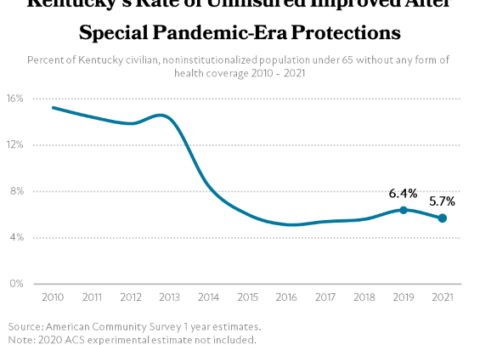New American Community Survey (ACS) data for 2016 released today by the U.S. Census shows poverty didn’t budge and income only increased slightly in Kentucky from 2015. The poverty rate was unchanged at 18.5 percent statewide and still elevated over the pre-recession 17.3 percent. Median household income grew an inflation-adjusted $871 since 2015 to $46,659, essentially the same as it was pre-recession.
“Along with stagnant unemployment, the new Census data shows Kentucky’s economy is not fully recovered,” Anna Baumann, research and policy associate for the Kentucky Center for Economic Policy, said. “Too many Kentucky families still struggle to make ends meet.”
Poverty remains exceptionally high for black Kentuckians at 30.2 percent and Hispanic Kentuckians at 30.6 percent, compared to white Kentuckians at 16.8 percent. There was no statistically significant change in the poverty rate for these racial groups in 2016.
Geographic as well as racial disparities illustrate the barriers to economic vitality that different communities in Kentucky face. 29.3 percent of people in the 5th Congressional District of eastern Kentucky lived in poverty in 2016, compared to 12.9 percent in the 4th district of northern Kentucky. For children, poverty was even more prevalent at 36.3 percent in the 5th district and 17.8 percent in the 4th (the highest and lowest in the state). No district saw a statistically significant change in poverty or child poverty since 2015.
“There are real barriers that contribute to stubbornly high poverty rates for communities in the commonwealth,” said Baumann. “Outright discrimination hurts black and Hispanic Kentuckians, but so do policy choices such as the failure to pass comprehensive criminal justice reform, a higher minimum wage and stronger pathways to legal status for immigrants. And we still haven’t adequately reinvested in eastern Kentucky communities facing the decline of coal.”
Despite two years of growth, median household income in 2016 was not statistically higher than in 2007 before the recession. For black and Hispanic Kentuckians, median household income in 2016 was statistically lower than for white Kentuckians at $32,231, $39,043 and $48,770, respectively.
“At a time when Kentucky so clearly needs policies that support broadly shared prosperity, it’s very concerning that federal and state lawmakers are considering ideas that would pull the rug out from under Kentuckians,” Baumann said. “Instead, we should be pursuing policies that help communities thrive like strengthening improvements made through the ACA, paid family leave, a higher minimum wage and child care support.”

